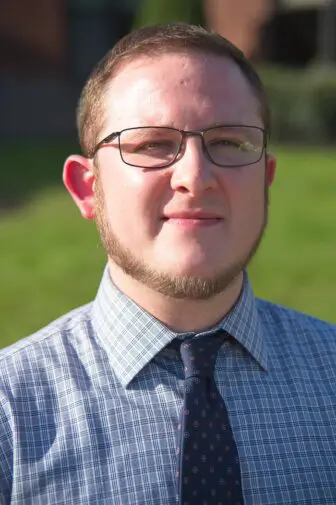Corey Dwyer is in his second year as principal of Beacon High School, which has about 850 students. His responses are excerpted from an interview for the Beaconites podcast.

You graduated from the high school where you are now principal. Does that feel strange?
I do have certain deja vu or flashback moments. I definitely would have been surprised at age 16 to think that I would be back in the principal’s office, although I wasn’t here a ton of times when I was a student! In high school, I was certain I was going to be a lawyer. I was a political science major in college and just about to start applying to law schools when I was accepted to Teach for America [in which participants work for two years in low-income schools]. I knew within the first couple of days that I wanted to stay in education. I ended up working at the school in Philadelphia where I was placed for nine years, the last five as principal.
This was early in your career. What did people see in you?
I don’t know! [laughs] I was able to build good relationships with students and with families. Schools in Philly are different from schools in a place like Beacon. The kids had different experiences than I had growing up. In Philly, 90 percent of the students qualified for free or reduced lunch. A lot of the things they had to deal with were pretty heavy. An important lesson for me was seeing that schools fill a lot of roles. For some kids, it’s a place where they can get two meals or medical care or counseling.
You’ve worn hearing aids since you were 4 years old. What sort of challenges did that present?
In my case, it built resilience and taught me to advocate for myself. As a kid, you don’t want to be different. So it wasn’t until high school that I was comfortable going to my teachers and saying, “This is what I need,” or “This is not working for me.” I’m super proud of our students when they advocate for themselves, or for a cause. My experience has informed the way I look at students speaking up for themselves. It’s empowering for kids to see people in positions of authority, like a principal or a teacher, navigate personal challenges and still show up every day.
Hiring a teacher seems like a high-stakes decision. How do you go about it?
We don’t have a lot of teacher turnover. Last year we had two teachers retire, and that was it. I think in terms of, how do you interest folks in working here? A big part for me is having them come on campus and walk around, see what they see, talk to students. We’ll do demo lessons where a prospective teacher will teach a mini-lesson to a class and one of us will walk the candidate out while the other folks stay around and listen to the students’ feedback. We have a supportive city and community behind us. The budget passes overwhelmingly every year; that’s a big selling point for a lot of teachers.
How do you identify students who might be in distress?
As a teacher, you always want to be standing at the door as your students arrive and do a quick scan: A student normally comes in with a smile, but on a given day, they’re not smiling. I stand at the front of the school most mornings, along with a few of our guidance counselors. It’s important to have systems in place; we have a student services suite, three full-time social workers, a school psychologist, a youth aide.
There has been a lot made about the mental health struggles of our young people. That’s certainly something we’re seeing in high school, and it’s probably true at every high school in the country. There’s a ton of research about how powerful it can be for a student to have even one meaningful connection with an adult who works at their school. Our kids are living in an entirely different world. They like immediate feedback, constant stimulation. Sometimes you need to be able to take a step back and slow down, but it’s hard for kids to do these days, especially with social media and the pressure of constantly being accessible. Plus, a lot of our students are attuned to what’s going on in the world.

